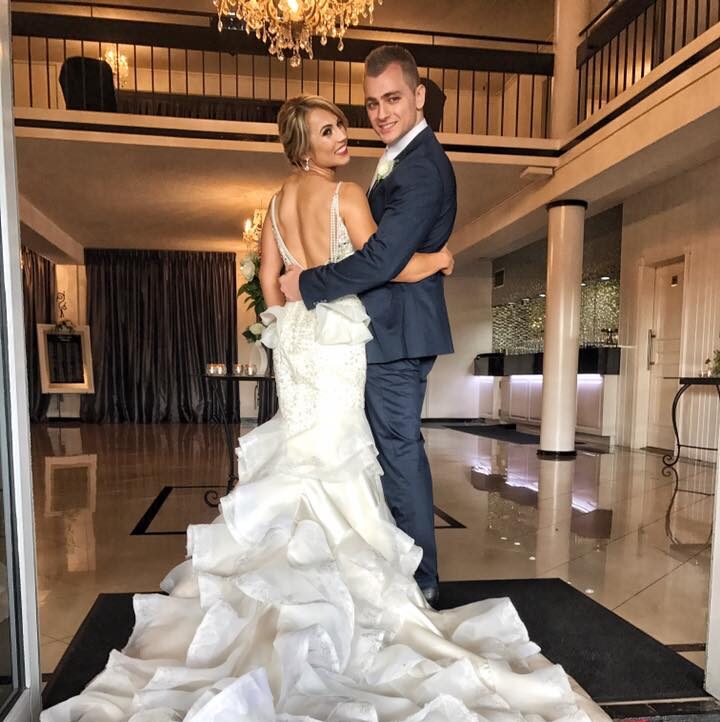Not interested in a “destroy the dress” picture session after your wedding? Do you like to take a peek at your wedding gown every now and again, even after the big day has passed? Or are you planning to wear the dress again after the party?
After you say “I do,” preserving your wedding dress is one of your top priorities. You’ve just spent the day outside with the one you love, sharing delicious meals, refreshing beverages, passionate dances, and passionate kisses. It’s likely that after such a fantastic day, your dress doesn’t appear as pristine as it did when you first put it on.
Get It Cleaned
Dresses for weddings may seem delicate, yet many of them sustain serious damage throughout the celebration. Dresses need to be cleaned after the wedding because of the wear and tear that occurs from eating, drinking, and dancing in them, especially if the dress is white or another light colour.
Many wedding gowns include intricate beading, decorations, and extra fabric that may make washing them oneself quite difficult. This can make it difficult to store the dress in perfect shape for years to come. Spot cleaning the odd wine stain is doable, but sprucing up the most ornate dresses on your own is an uphill battle.
Investigate The Spot
The best method of stain removal will depend on the kind of stain. Knowing if the stains on your clothing are oil or water based is the first step in successfully removing them. Check out some advice on how to treat various stains.
Every Stain Should Be Treated The Same Way.
It would be a waste of time to try to wipe the stain out of your garment without first identifying it. If you don’t carefully clean the area, you risk ruining the garment.
Handle It With Care
If you went for a dress with intricate features like guipure or embroidery with glittering jewels, there are a lot of minor things that require your extra care. These items are best cleaned by hand. But if you don’t feel like dealing with the hassle, you can always take it to your local reliable laundry service and have them clean it for you.
Don’t Just Throw Everything In The Washing.
A standard washing machine should not be trusted with anything as exquisite and fragile as that outfit. Attempting to do so would result in a major catastrophe for your clothing.
Dress cleaning might be an option if you’re the hands-on kind and your dress isn’t made of silk or taffeta (or similarly fragile fabric). When the bride doesn’t feel particularly attached to the dress, as would be the case with a secondhand gown, she may try to clean it herself. Some warnings and suggestions for washing your gown follow.
Delicate Materials
Traditional cleaning chemicals do not fare well on silk and other delicate textiles and may cause irreparable harm.
Polyester Organza
When pressing, be very careful around any organza accents on your garment. The crispness of organza is easily destroyed by heat, thus it is not recommended that you try to press it by hand.
Brushes
Use brushes with very delicate bristles while caring for your clothing. Fraying and even fabric pulls might result from using a hard brush on a delicate cloth.
Bleach
Porcelain, ivory , and frost are just a few examples of the various variations on the colour white. If there are any stains on your ivory dress that you know will be difficult to remove, you should not bleach it.
Do not bleach any parts of your gown. When it comes to cleaning a gown, bleach is one of the toughest chemicals you may use, and the outcomes, for better or worse, are irreversible.
The Best Way To Clean A Wedding Dress
Dry cleaning is an option, as is dry cleaning at home or doing it yourself in a laundromat if the dress is huge and/or voluptuous, or if the fabric is delicate, like silk.
Knowing that the chemicals used by expert dry cleaners might really melt beading and crystals has further dissuaded them from employing one. Not here, not if we had to hire someone to hand wash the outfit!
Many brides opt for the quick fix of merely treating the stained areas of their dresses rather than washing the whole thing before the big day.
Spot Treatment:
In an effort to save time before cleaning the garment, we tried using her mother’s Dryel on the Go Stain Pen on the stains. Unfortunately, the stains were too massive and had been there for too long to be completely removed, but at least it was a beginning.
Stain treatment:
With the expectation that we would be cleaning it by hand, we stocked up on stain-fighting products like Ariel and the carpet cleaner Vanish, both of which come highly recommended. We sprayed all of the problem spots as we moved around them.
The dress arrived with stains on the bottom of the train. It was too close to the wedding for Mom to attempt to bring them out with Dryel, but we would give it a go.
Soak:
After disinfecting the tub, we filled it with cold water, sprinkled the bottom of the dress with a mixture of Vanish stain powder (similar to OxiClean powder) and mild liquid detergent, and then swished it about. We hung the bottom of the dress up and soaked it for a whole night.
Scrubbing:
The dress grew rather soiled in both Hawaii and the Swiss Alps, so each morning we would walk around and gently clean the worst affected places with a sock and a toothbrush. If you clean too vigorously, you may end up damaging the cloth.
Aside from that, we took this time to remove hairs from the hem and a tone of nettles that had grown larger in the water. We had no idea that the outfit was stuffed with junk from the great outdoors!
Bleach:
After a good cleaning, we removed the dress from the tub and used a bleach/water solution to spot-treat the very tenacious stains on the delicate lace. We took a sock and soaked it in bleach, then very carefully wiped it on the lace and left it to dry on the balcony.
Final Soak:
Over a second time, we soaked everything for several hours in a mixture of Vanish and mild detergent.
Spot Treatment:
We went over the bodice and top with the Dryel one more when it was soaking, and we were able to remove the remaining spots, making it seem like new.
Repair:
We repaired the back of the corset, which was about to come apart, and we sewed down any dangling appliques or beads while the dress hung. Just like new!
Rinse:
After rinsing everything off, we turned off the water and emptied the tub. After that, we ran a couple more rinses in the full tub, emptied it, and switched back to the shower. Take away all the detergent you can.
Dry:
We let it air dry on a large drying rack in the backyard and then hung it inside with a towel below. It ended up looking fantastic once it dried.
The washing had made the dress seem like new, and the lace, which had been literally brown before, was now bright and white.
There was no dirt or dust on the bottom of the train, making it seem even better than when we initially got the dress! Only one of the terrible blackish-brown stains was still faintly visible, and it was on the back of the garment, where no one saw it.
Should You Do It Yourself for Wedding Dress Cleaning?
Since you like to do things on your own, and since cleaning a dress can’t be that hard, why not give it a shot? Hold on a minute! Think about these things before you get out the detergent and attempt to clean your outfit at home.
Cost Of The Dress
The average bride will drop more cash on her wedding dress than she ever has on any other piece of apparel combined. Carefully treating the fabric of your dress so that it doesn’t speed up its age is essential whether you want to be able to pass it down to your children, wear it again in the future, or just retain your memories. Wedding gowns often have intricate embellishments like beading, embroidery, or lace, and most home washing systems lack the chemicals and technology required to properly clean and maintain such details.
It’s also important to think about how disappointed you’d be if your chosen cleaning procedure ruined the dress by leaving wrinkles, discoloration, missing embellishments, or even holes.
Cost Of The Cleaning
If you decide to clean the dress on your own, remember that you may need to purchase certain supplies that you don’t currently have. The length of the skirt of a typical wedding dress may exceed the capacity of the average household washing machine. In the event you want to launder your gown, you may need the services of a commercial-sized washer and dryer. In addition, you’ll need to buy delicate detergents, stain remover chemicals, and so on, all of which should be selected with your dress’s fabric and embellishments in mind. Only very basic dresses made of cotton or polyester/man-made fabric should be cleaned at home.
Know How To Keep A Dress Preserve?
The cleaning process is barely half complete. Proper storage is essential to preserving the beauty of your clothing for years to come. For this reason, it must be shielded from the sun’s rays, as well as acids and other chemicals. It is important to remember that certain detergents may be behind residues in fabric before putting the garment away for storage. Wrapping your dress with tissue paper is a common piece of advice, but if the paper is coloured, it might permanently stain your gown via a process known as “colour transfer.”
Get Peace Of Mind
If you’re starting to feel like it’s too much trouble, you’re not alone. We have years of experience cleaning and preserving bridal gowns, so we can remove all the hassle from the process and return a pristine garment that is suitable for long-term storage. Don’t let months or years go by and risk ruining your outfit. If you put your faith in us, we can help preserve your gown so that it continues to shine for years to come.
DIY Cleaning With Precautions:
If you want expert outcomes while having your wedding dress cleaned, keeping the following in mind might be very useful. If you want to clean your wedding dress yourself, there are a few guidelines you should keep in mind. The bride must wear white cotton gloves at all times when touching the bridal dress. It is essential to do a spot test to ensure that the cleaning method will not cause any damage to the fabric. Since soft-bristled brushes are preferable for cleaning wedding gowns, a gentle toothbrush may do wonders for the cleaning. The bleaching of bridal dresses is strictly forbidden since the effects of the harsh chemicals on the delicate fabric would be permanent.
The cleaned bridal gown should be stored away from direct sunlight and extreme temperatures in an acid-free container. Placing some silica desiccant sachets inside the container in which the cleaned wedding dress will be stored is a helpful hack for avoiding the garment from being damaged by excess humidity and moisture. You should never put the dress in a basement, garage, cellar, or attic because of the severe temperatures and humidity that may be found there.
Why Clean Your Wedding Dress Yourself?
There’s no conceivable reason for you to launder your own wedding gown. It does state “Dry-clean only” on the label, right? Do you really want to take that kind of chance with such a pricey and sentimental piece of clothing?
Saving Money
If you need to save money, you may always wash your gown by yourself. It’s not cheap to get a wedding dress cleaned. How come? Most dresses used on wedding days are composed of materials that can be cleaned. In fact, if both the outside fabric and the inner lining of your bridal gown are cotton, you should be able to clean it on your own with little effort by using a gentle hand wash.
You probably want to save your wedding dress since it was such a big expense. A well-kept wedding gown will last forever, and you may relive that special day whenever you choose.
Not only should wedding clothes be treated with respect, but so should everything else you own. Do you take care of the many treasured family treasures that have come into your possession? Insist that everyone else in your home maintains the same high standard of cleanliness you do with your own things.
Preserving your wedding dress is one of your top priorities after the big day. Dresses for weddings may seem delicate, yet many of them sustain serious damage throughout the celebration. Spot cleaning the odd wine stain is doable, but sprucing up the most ornate dresses on your own is an uphill battle. If you don’t feel like dealing with the hassle, you can always take it to your local reliable laundry service. Dress cleaning might be an option if you’re the hands-on kind and your dress isn’t made of silk or taffeta (or similarly fragile fabric).
When the bride doesn’t feel particularly attached to the dress, she may try to clean it herself. Some warnings and suggestions for washing your gown follow. “We had no idea that the outfit was stuffed with junk from the great outdoors!”. “The dress grew rather soiled in both Hawaii and the Swiss Alps, so each morning we would walk around and gently clean the worst affected places with a sock and a toothbrush.
If you clean too vigorously, you may end up damaging the cloth.”. The average bride spends more on her wedding dress than she does on any other piece of apparel combined. Carefully treating the fabric of your dress so that it doesn’t speed up its age is essential whether you want to pass it down to your children, wear it again in the future, or just retain your memories.




